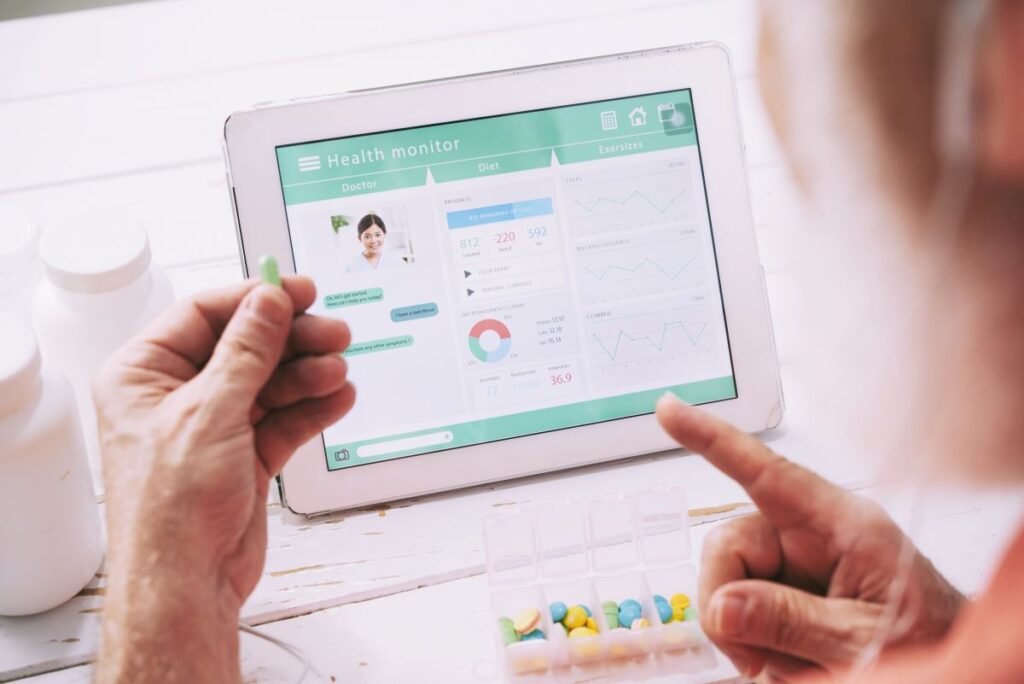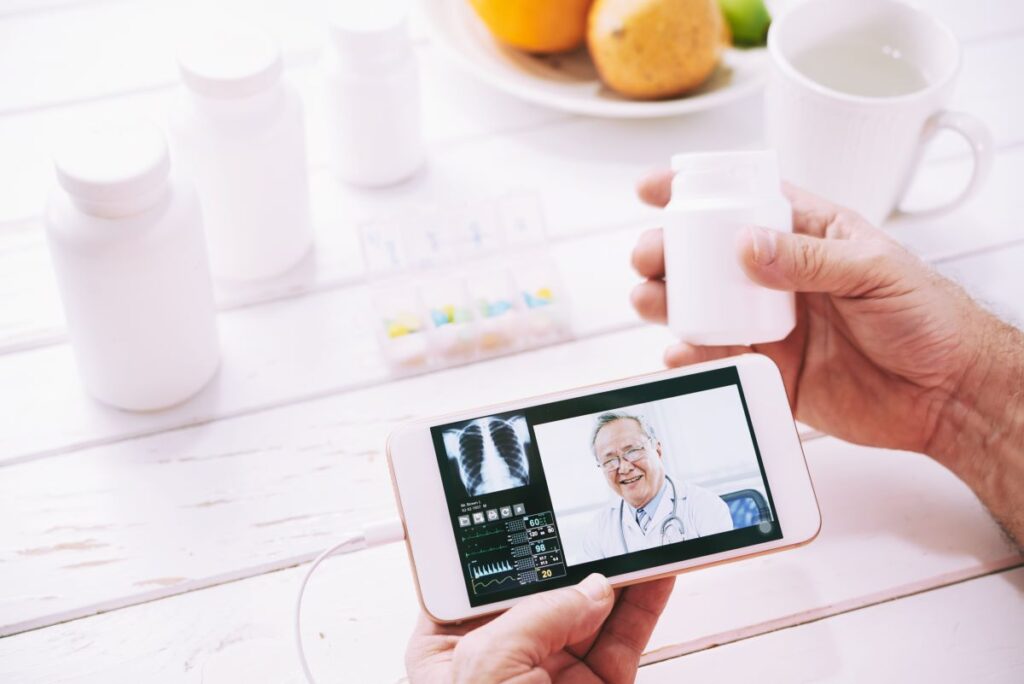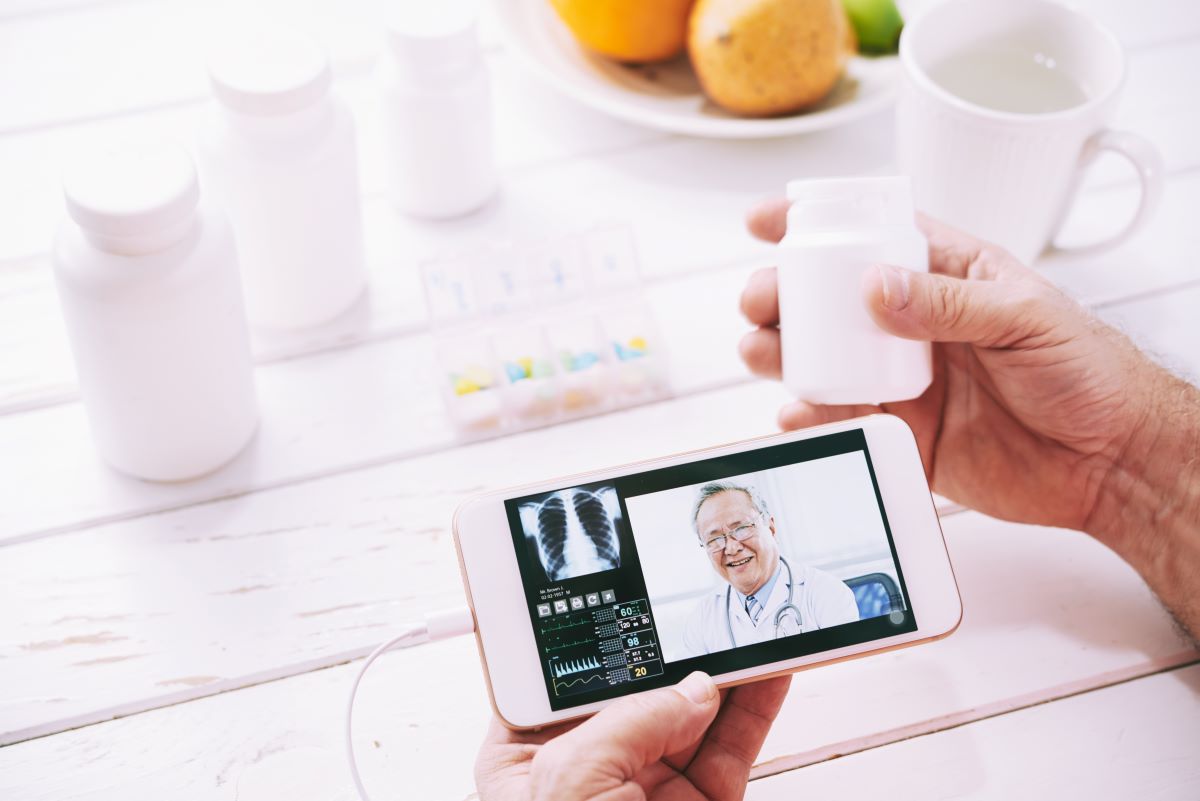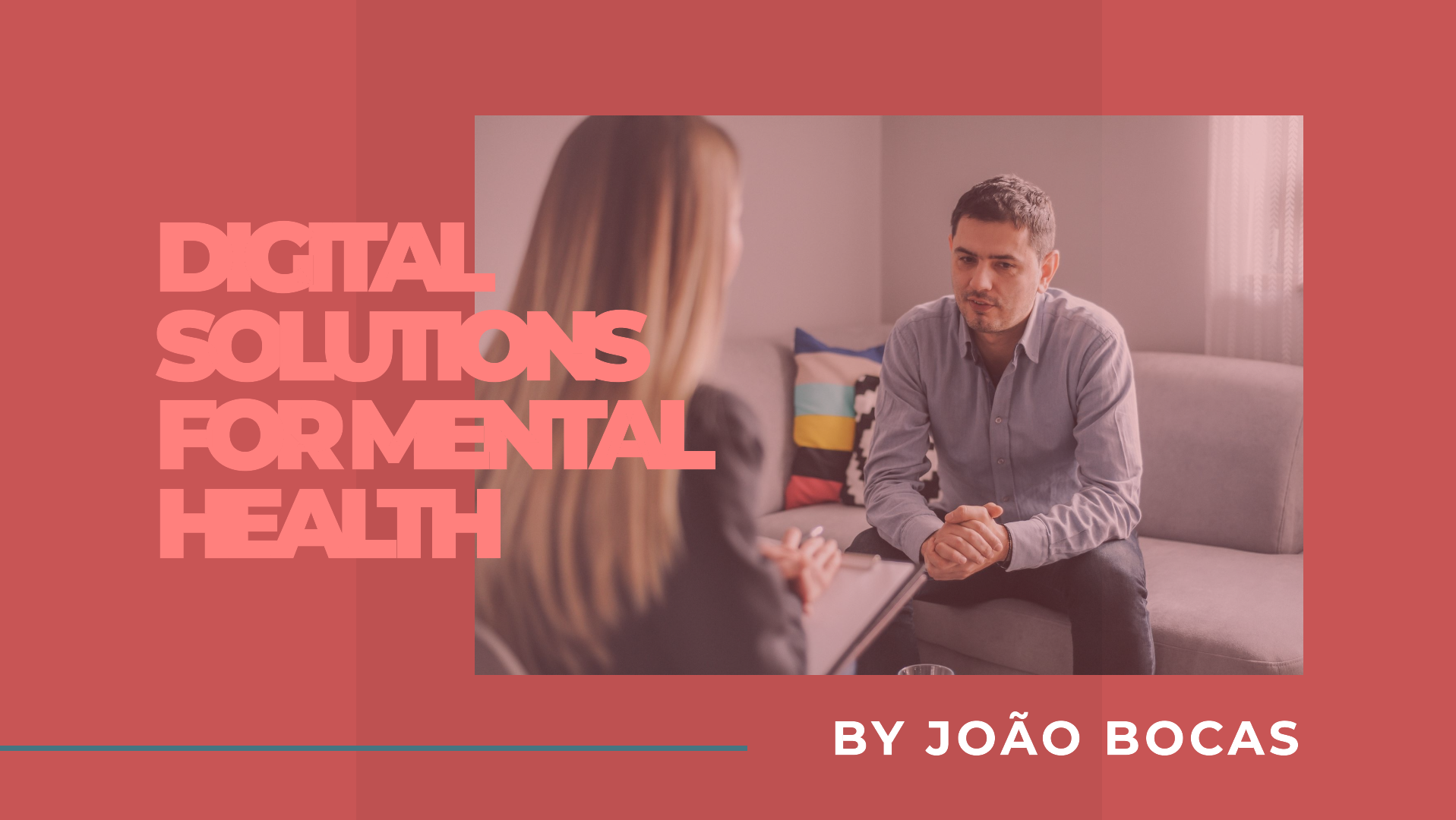In the dynamic landscape of healthcare, the integration of HealthTech solutions has revolutionized the way patients engage with their health and well-being. From telemedicine to wearable devices, digital innovations have empowered individuals to take charge of their health journey, access quality care, and make informed decisions. Let’s delve into the myriad benefits that HealthTech offers to patients seeking to enhance their personal well-being.
The 7 benefits of healthtech for patients are:
- Convenience and Accessibility
- Personalized Health Monitoring
- Improved Engagement and Empowerment
- Enhanced Communication and Collaboration
- Remote Monitoring and Chronic Disease Management
- Faster Access to Specialist Care
- Data-Driven Insights and Predictive Analytics
1. Convenience and Accessibility
HealthTech bridges the gap between patients and healthcare providers, offering convenient access to medical services from anywhere at any time. Through telemedicine platforms and mobile health apps, patients can schedule virtual consultations, receive remote monitoring, and access health information with ease, eliminating the constraints of traditional healthcare settings and enhancing accessibility for all.
In today’s fast-paced world, HealthTech has emerged as a transformative force in healthcare, revolutionizing the delivery of medical services by prioritizing convenience and accessibility for patients. By bridging the gap between individuals and healthcare providers, HealthTech solutions have redefined the patient experience, offering seamless access to care from the comfort of one’s own surroundings. Through the integration of telemedicine platforms and mobile health apps, patients can now schedule virtual consultations, receive remote monitoring, and access valuable health information with unparalleled ease and efficiency.
The advent of telemedicine has ushered in a new era of healthcare delivery, allowing patients to connect with healthcare professionals remotely, without the constraints of physical proximity or traditional office hours. Virtual consultations enable individuals to seek medical advice, discuss treatment options, and receive personalized care plans from anywhere at any time, empowering them to prioritize their health on their terms. Additionally, remote monitoring capabilities provided by HealthTech solutions allow patients to track their vital signs, medication adherence, and symptom progression in real-time, facilitating proactive management of chronic conditions and early intervention when needed.
Moreover, mobile health apps serve as invaluable tools for accessing health information, monitoring wellness metrics, and engaging in self-care practices effortlessly. By leveraging these digital resources, patients can take proactive steps towards optimizing their health, making informed decisions, and seeking timely medical attention when necessary. The elimination of geographical barriers and the enhancement of accessibility through HealthTech not only improve patient outcomes but also promote a culture of proactive healthcare management and patient empowerment in the digital age.
2. Personalized Health Monitoring
Wearable devices and health tracking apps enable patients to monitor their vital signs, fitness levels, sleep patterns, and overall health metrics in real-time. By tracking and analyzing these data points, individuals can gain valuable insights into their well-being, set health goals, and make informed lifestyle choices to optimize their physical and mental health.
In the realm of personal health monitoring, HealthTech innovations such as wearable devices and health tracking apps have revolutionized the way patients engage with their well-being. These tools empower individuals to track vital signs, fitness levels, sleep patterns, and overall health metrics in real-time, providing a comprehensive overview of their physical and mental well-being. By leveraging wearable devices and health tracking apps, patients can gain valuable insights into their health status, enabling them to set personalized health goals and make informed lifestyle choices to optimize their overall well-being.
The seamless integration of wearable devices into daily routines enables continuous monitoring of key health parameters, offering a holistic understanding of one’s physiological state. Whether tracking heart rate, steps taken, hours of quality sleep, or caloric intake, these devices provide individuals with real-time data that can inform their daily habits and behaviors. By analyzing trends and patterns in their health metrics, patients can identify areas for improvement, monitor progress towards their wellness goals, and make educated decisions to enhance their physical and mental health.
Health tracking apps complement wearable devices by centralizing and organizing health data, empowering patients to visualize trends, set achievable goals, and track their progress over time. These apps often offer personalized recommendations, reminders, and motivational tools to support individuals in maintaining healthy habits and staying motivated on their health journey. By fostering self-awareness, goal-setting, and data-driven decision-making, personalized health monitoring through wearable devices and health tracking apps empowers patients to take proactive steps towards improving their well-being and achieving optimal health outcomes.

3. Improved Engagement and Empowerment
HealthTech solutions foster active patient engagement by providing personalized health information, educational resources, and interactive tools for self-management. Patients are empowered to become proactive participants in their care journey, fostering a sense of ownership, autonomy, and accountability in achieving optimal health outcomes.
The advent of HealthTech solutions has ushered in a new era of patient engagement and empowerment, redefining the traditional patient-provider dynamic. By offering personalized health information, educational resources, and interactive tools for self-management, HealthTech solutions empower patients to take an active role in their care journey, fostering a sense of ownership, autonomy, and accountability in achieving optimal health outcomes.
Through tailored health information and educational resources, patients can access credible and relevant information about their health conditions, treatment options, and preventive measures. HealthTech platforms curate content that is personalized to each individual’s needs, empowering patients to make informed decisions about their health and well-being. By equipping patients with knowledge and resources, HealthTech solutions enable them to actively participate in their care, ask informed questions, and collaborate with healthcare providers to develop personalized care plans.
Interactive tools for self-management provided by HealthTech solutions enable patients to track their symptoms, medications, appointments, and lifestyle behaviors easily and efficiently. These tools not only promote adherence to treatment plans but also encourage patients to monitor their progress, set goals, and make adjustments based on their health data. By fostering self-management skills and promoting a proactive approach to health, HealthTech solutions empower patients to take control of their well-being and work towards achieving their health goals.
Furthermore, the engagement facilitated by HealthTech solutions enhances communication between patients and healthcare providers, creating a collaborative care environment that values shared decision-making and mutual respect. Patients feel empowered to voice their concerns, preferences, and goals, leading to more patient-centered and effective care delivery. Ultimately, by fostering improved engagement and empowerment, HealthTech solutions play a vital role in promoting patient agency, enhancing health outcomes, and transforming the healthcare experience into a collaborative partnership between patients and providers.
4. Enhanced Communication and Collaboration
Digital health platforms facilitate seamless communication and collaboration between patients, caregivers, and healthcare providers. Secure messaging features, telehealth consultations, and electronic health records enable efficient information sharing, care coordination, and shared decision-making, fostering a holistic approach to patient care and promoting continuity across healthcare settings.
The advancement of digital health platforms has transformed the landscape of communication and collaboration among patients, caregivers, and healthcare providers. These platforms serve as virtual hubs that facilitate seamless interaction, information sharing, and coordinated care delivery, ultimately fostering a holistic approach to patient care and promoting continuity across various healthcare settings.
One of the key pillars of enhanced communication in digital health platforms is the integration of secure messaging features. Patients can communicate with their healthcare providers, ask questions, share updates on their health status, and receive responses in a secure and confidential manner. This real-time communication channel not only fosters patient engagement but also ensures that individuals can seek guidance from their providers promptly, leading to improved health outcomes and a strengthened patient-provider relationship.
Telehealth consultations offered through digital health platforms have revolutionized the way healthcare services are delivered, particularly in remote or underserved areas. Patients can access virtual appointments with their healthcare providers, discuss treatment plans, receive medical advice, and even participate in therapy sessions from the comfort of their homes. This convenience not only saves time and reduces logistical burdens for patients but also promotes timely access to care and decision-making, ensuring that healthcare services are delivered efficiently and effectively.
Moreover, electronic health records (EHRs) play a crucial role in enhancing communication and collaboration by centralizing patient information and enabling seamless data sharing among care team members. Healthcare providers can access comprehensive patient histories, test results, medication lists, and treatment plans, promoting informed decision-making and care coordination across disciplines. By ensuring that all stakeholders have access to up-to-date and accurate health information, digital health platforms facilitate shared decision-making, streamline care transitions, and promote continuity of care for patients.
Overall, the integration of digital health platforms in healthcare settings has revolutionized communication and collaboration practices, offering a more interconnected and patient-centric approach to care delivery. By leveraging secure messaging features, telehealth consultations, and electronic health records, stakeholders can work together seamlessly to provide comprehensive, coordinated, and personalized care that prioritizes patient well-being and promotes positive health outcomes.
5. Remote Monitoring and Chronic Disease Management
For patients managing chronic conditions, HealthTech offers remote monitoring solutions that enable continuous tracking of symptoms, medication adherence, and progress over time. By leveraging remote monitoring devices and telehealth services, individuals with chronic diseases can receive timely interventions, personalized care plans, and ongoing support to manage their conditions effectively.
HealthTech has emerged as a game-changer, offering remote monitoring solutions that revolutionize the care experience for patients dealing with long-term health conditions. These innovative technologies enable continuous tracking of symptoms, medication adherence, and progress over time, empowering individuals with chronic diseases to take control of their health journey. By leveraging remote monitoring devices and telehealth services, patients can receive timely interventions, personalized care plans, and ongoing support to manage their conditions effectively.
Remote monitoring solutions provided by HealthTech platforms offer a proactive approach to chronic disease management by enabling patients to track vital health metrics from the comfort of their homes. Through wearable devices, smart sensors, and connected health tools, individuals can monitor key indicators such as blood pressure, blood glucose levels, heart rate, and more in real-time. This continuous monitoring not only provides patients with valuable insights into their health status but also enables healthcare providers to detect any deviations or trends that may require intervention.
Telehealth services complement remote monitoring by facilitating virtual consultations and remote check-ins with healthcare providers. Patients can discuss their symptoms, treatment plans, and progress with their care team without the need for in-person visits, reducing the burden of travel and waiting times. Healthcare professionals can leverage telehealth platforms to offer personalized advice, adjust treatment regimens, and provide emotional support to patients managing chronic conditions, fostering a collaborative and patient-centered approach to care delivery.
Moreover, remote monitoring solutions enable healthcare providers to remotely review patient data, identify patterns, and intervene proactively to prevent potential complications or exacerbations of chronic diseases. By analyzing trends in symptoms, medication adherence, and lifestyle factors, providers can tailor care plans, offer targeted interventions, and empower patients to make informed decisions about their health. The continuous monitoring and personalized support provided by HealthTech solutions not only enhance the quality of care for individuals with chronic diseases but also promote self-management, adherence to treatment protocols, and overall well-being in the long term.
In conclusion, remote monitoring solutions and telehealth services offered by HealthTech platforms play a vital role in transforming chronic disease management by promoting timely interventions, personalized care plans, and ongoing support for patients. By leveraging these technologies, individuals with chronic conditions can actively engage in their care, monitor their health status, and collaborate with healthcare providers to achieve optimal health outcomes and quality of life. The seamless integration of remote monitoring solutions in chronic disease management exemplifies the potential of HealthTech to revolutionize care delivery and empower patients to take charge of their health and well-being.

6. Faster Access to Specialist Care
Telemedicine services and virtual consultations have revolutionized the healthcare landscape by offering patients faster access to specialist care, overcoming geographical barriers and scheduling constraints. Through video appointments and remote consultations, individuals can easily seek expert opinions, second opinions, and specialized treatment recommendations without the need for lengthy wait times or travel arrangements. This seamless access to specialist care ensures timely and efficient care delivery, ultimately enhancing patient outcomes and satisfaction.
One of the key advantages of telemedicine services is the ability to connect patients with specialist providers regardless of their location. Patients in remote or underserved areas can access expert care without the need to travel long distances or endure extended wait times for in-person appointments. This democratization of healthcare services allows individuals to receive timely interventions, diagnosis, and treatment recommendations from specialists, ensuring that they can address their health concerns promptly and without unnecessary delays.
Virtual consultations also offer convenience and flexibility for patients seeking specialist care. By eliminating the need for physical visits to healthcare facilities, individuals can schedule appointments at their convenience, saving time and reducing the logistical challenges associated with traditional in-person consultations. This flexibility empowers patients to prioritize their health needs while accommodating their work, family, and personal commitments, ensuring that specialist care remains accessible and manageable within their daily routines.
Furthermore, virtual consultations foster collaboration between primary care providers and specialist physicians, enabling seamless communication and shared decision-making regarding patient care. Through telemedicine platforms, healthcare teams can exchange information, review test results, and develop coordinated care plans that align with the patient’s needs and preferences. This multidisciplinary approach to healthcare ensures that patients receive comprehensive and well-coordinated care that is tailored to their unique circumstances, ultimately leading to improved health outcomes and patient satisfaction.
Telemedicine services and virtual consultations offer patients expedited access to specialist care, transcending geographical boundaries and time constraints to provide timely and efficient healthcare services. By leveraging these technologies, individuals can seek expert opinions, second opinions, and specialized treatment recommendations with convenience and flexibility. The integration of telemedicine in healthcare not only enhances patient access to specialist care but also promotes collaboration among healthcare providers, leading to more personalized and effective care delivery for patients across diverse healthcare settings.
7. Data-Driven Insights and Predictive Analytics
HealthTech leverages data analytics, artificial intelligence, and machine learning algorithms to generate actionable insights, predictive analytics, and personalized recommendations for patients. By analyzing large datasets and patient information, HealthTech solutions can identify trends, risk factors, and preventive measures to anticipate health outcomes, tailor interventions, and optimize care delivery based on individual needs.
HealthTech has ushered in a new era of healthcare by harnessing the power of data analytics, artificial intelligence, and machine learning algorithms to provide data-driven insights, predictive analytics, and personalized recommendations for patients. By analyzing vast datasets and patient information, HealthTech solutions can uncover trends, risk factors, and preventive measures to anticipate health outcomes, tailor interventions, and optimize care delivery based on individual needs.
One of the key benefits of employing data-driven insights in healthcare is the ability to identify patterns and correlations within large datasets that human analysis may overlook. By leveraging artificial intelligence and machine learning algorithms, HealthTech platforms can process and interpret complex healthcare data to generate actionable insights for healthcare providers and patients. These insights may include early warning signs, treatment recommendations, risk assessments, and predictive models that enable proactive and personalized care management strategies.
Predictive analytics play a crucial role in forecasting health outcomes and identifying potential risks for patients. By analyzing historical data, clinical parameters, and lifestyle factors, HealthTech solutions can predict disease progression, complications, and adverse events, allowing healthcare providers to intervene early and implement preventive measures. Predictive analytics also enable the customization of care plans and interventions based on individual patient profiles, enhancing treatment effectiveness and patient outcomes.
Moreover, HealthTech solutions utilize data-driven insights to personalize recommendations and interventions for patients, catering to their unique needs and preferences. By considering individual health histories, genetic factors, lifestyle choices, and treatment responses, these platforms can offer tailored advice on wellness strategies, medication regimens, and behavioral modifications. This personalized approach empowers patients to take proactive steps towards optimizing their health and well-being, fostering a sense of ownership and accountability in managing their care.
In summary, the integration of data analytics, artificial intelligence, and machine learning in HealthTech enables the generation of data-driven insights, predictive analytics, and personalized recommendations that revolutionize care delivery and patient outcomes. By leveraging these technologies, healthcare providers can anticipate health trends, mitigate risks, and tailor interventions to meet individual needs effectively. The data-driven approach offered by HealthTech not only enhances the quality and efficiency of healthcare services but also empowers patients to make informed decisions and take control of their health journey in a proactive and personalized manner.
The benefits of healthtech
As we navigate the evolving landscape of healthcare, the benefits of HealthTech for patients are abundant, promising personalized care, enhanced engagement, and improved health outcomes. By embracing digital innovations that prioritize convenience, empowerment, and collaboration, patients can embark on a journey towards better health, well-being, and quality of life. Let us continue to harness the transformative power of HealthTech to empower patients, foster healthier communities, and shape a future where personalized care is at the heart of healthcare excellence.
Digital Health Insights is dedicated to exploring the diverse benefits of HealthTech for patients and promoting a culture of innovation, empowerment, and well-being in healthcare. Stay tuned for more updates, trends, and stories on how HealthTech is reshaping the patient experience and transforming healthcare delivery for the better. Together, let us embrace the possibilities of HealthTech to empower patients and drive positive change in healthcare.
Thank you for embarking on this transformative journey through healthtech. To continue exploring the latest insights and innovations in digital healthcare, wearables, and patient-centered care, we invite you to engage with us through the following channels:
- Digital Salutem Website: Stay updated with the latest digital health news and insights by visiting Digital Salutem.
- Healthcare Uncomplicated on YouTube: Dive deeper into the topics discussed in this article and more on our YouTube Channel.
- Digital Salutem Podcast: Tune in to our thought-provoking discussions on the Digital Salutem Podcast. Discover profound insights into healthcare transformation on Soundcloud and Spotify.
- Share Your Thoughts: Your feedback is invaluable to us! Share your opinions on digital health, patient care, wearables, or any relevant topics by commenting here or emailing us at info@digitalsalutem.com.
- Connect with Us: For inquiries regarding Digital Healthcare Transformation, Healthcare organizational growth, or Healthcare brand positioning, reach out to us at +44 (0)1273 458590.
Your engagement and insights are vital to advancing the dialogue around digital health, patient-centered care, and healthcare innovation. Together, we can shape a future where digital technologies empower individuals, transform healthcare delivery, and foster a more equitable, connected global community committed to improving health outcomes and well-being for all.
Embrace the possibilities of digital health and join us on this transformative journey towards a healthier, more connected world where technology, innovation, and compassion converge to redefine the future of healthcare. Thank you for embarking on this exploration of digital healthcare, where every digital advancement brings us closer to a future where health is accessible, personalized, and transformative.





